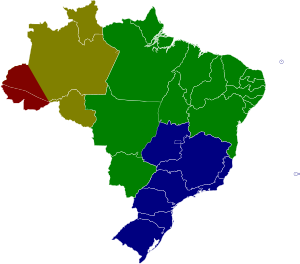Daylight saving time in Brazil

The most recent Brazilian DST started on 16 October 2016.
Daylight saving time in Brazil (called horário de verão—"summer time"—in Portuguese) was first adopted in 1931.[1] Initially, it applied to the whole country (with an exception in part of 1963); since 1988, it started being used only in part of the country.[2]
The duration and regional applicability of DST has varied over the years (see Portuguese Wikipedia page for details). As of 2013, DST is used only in the southern region (the states of Rio Grande do Sul, Santa Catarina, Paraná), the southeast region (the states of São Paulo, Rio de Janeiro, Espirito Santo, Minas Gerais), and the central-west region (the states of Goiás, Mato Grosso and Mato Grosso do Sul, and the Distrito Federal).[3]
Formerly, starting and ending dates were variable, but in 2008, a decree (No. 6558 of 9 September 2008) established a permanent rule: DST starts at 00:00 on the third Sunday in October and ends at 00:00 on the third Sunday in February—unless the latter falls during Carnaval: in this case, the end of DST is postponed by one week. Near-past and near-future years in which the end of DST is scheduled to be postponed are 2012, 2015, 2023, 2026, 2034, and 2037.
History
Before 2008, there were no fixed start and end dates for summer time, nor which states should or should not follow it; they were decided every year by one or more decrees, sometimes published very close to their start date.[2]
On 8 September 2008, Presidential Decree n. 6.558 established fixed start and end dates and listed the Brazilian federative units that will annually observe daylight saving time.[3] Later, Presidential Decree n. 7.584, of 13 October 2011, added the state of Bahia to the list of DST observing territories.[4] In 2012, the observing states were changed again: Bahia was excluded from daylight saving time, and Tocantins was included for the first time.[5] Tocantins stopped observing daylight saving time in 2013.
References
- ^ "Histórico do Horário de Verão" (in Portuguese). Retrieved 2007-01-23.
- ^ a b "Decretos sobre o Horário de Verão no Brasil" (in Portuguese). Retrieved 2007-01-23.
- ^ a b "Decreto 6.558 de 2008, sobre o Horário de Verão no Brasil" (in Portuguese). Retrieved 2008-11-08.
- ^ "Decreto 7.584 de 2011, sobre o Horário de Verão no Brasil" (in Portuguese). Retrieved 2011-10-16.
- ^ "Decreto 7.826 de 2012, sobre o Horário de Verão no Brasil" (in Portuguese). Retrieved 2012-10-19.
